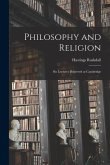Emile DurkheimNotes from the Lycee de Sens Course, 1883-1884
Durkheim's Philosophy Lectures
Notes from the Lycee de Sens Course, 1883-1884
Herausgeber: Gross, Neil; Jones, Robert Alun
Emile DurkheimNotes from the Lycee de Sens Course, 1883-1884
Durkheim's Philosophy Lectures
Notes from the Lycee de Sens Course, 1883-1884
Herausgeber: Gross, Neil; Jones, Robert Alun
- Broschiertes Buch
- Merkliste
- Auf die Merkliste
- Bewerten Bewerten
- Teilen
- Produkt teilen
- Produkterinnerung
- Produkterinnerung
Emile Durkheim sets out to introduce students to the field of philosophy.
Andere Kunden interessierten sich auch für
![An Introduction to Mill's Utilitarian Ethics An Introduction to Mill's Utilitarian Ethics]() Henry R. WestAn Introduction to Mill's Utilitarian Ethics41,99 €
Henry R. WestAn Introduction to Mill's Utilitarian Ethics41,99 €![Philosophy from a Skeptical Perspective Philosophy from a Skeptical Perspective]() Joseph AgassiPhilosophy from a Skeptical Perspective31,99 €
Joseph AgassiPhilosophy from a Skeptical Perspective31,99 €![Philosophy in History Philosophy in History]() Richard Rorty / B. Schneewind / Quentin Skinner (eds.)Philosophy in History40,99 €
Richard Rorty / B. Schneewind / Quentin Skinner (eds.)Philosophy in History40,99 €![Philosophy Philosophy]() F. B. JevonsPhilosophy54,99 €
F. B. JevonsPhilosophy54,99 €![Francis Bacon, the State and the Reform of Natural Philosophy Francis Bacon, the State and the Reform of Natural Philosophy]() Julian MartinFrancis Bacon, the State and the Reform of Natural Philosophy28,99 €
Julian MartinFrancis Bacon, the State and the Reform of Natural Philosophy28,99 €![Syllabus Of Philosophical Lectures Given During Each Half Year At Poplar House Academy, January, 1826 (1826) Syllabus Of Philosophical Lectures Given During Each Half Year At Poplar House Academy, January, 1826 (1826)]() J. S.Syllabus Of Philosophical Lectures Given During Each Half Year At Poplar House Academy, January, 1826 (1826)23,99 €
J. S.Syllabus Of Philosophical Lectures Given During Each Half Year At Poplar House Academy, January, 1826 (1826)23,99 €![Philosophy and Religion; Six Lectures Delivered at Cambridge Philosophy and Religion; Six Lectures Delivered at Cambridge]() Hastings RashdallPhilosophy and Religion; Six Lectures Delivered at Cambridge23,99 €
Hastings RashdallPhilosophy and Religion; Six Lectures Delivered at Cambridge23,99 €-
-
-
Emile Durkheim sets out to introduce students to the field of philosophy.
Hinweis: Dieser Artikel kann nur an eine deutsche Lieferadresse ausgeliefert werden.
Hinweis: Dieser Artikel kann nur an eine deutsche Lieferadresse ausgeliefert werden.
Produktdetails
- Produktdetails
- Verlag: Cambridge University Press
- Seitenzahl: 358
- Erscheinungstermin: 21. Januar 2011
- Englisch
- Abmessung: 229mm x 152mm x 21mm
- Gewicht: 581g
- ISBN-13: 9780521175425
- ISBN-10: 0521175429
- Artikelnr.: 32467958
- Herstellerkennzeichnung
- Libri GmbH
- Europaallee 1
- 36244 Bad Hersfeld
- gpsr@libri.de
- Verlag: Cambridge University Press
- Seitenzahl: 358
- Erscheinungstermin: 21. Januar 2011
- Englisch
- Abmessung: 229mm x 152mm x 21mm
- Gewicht: 581g
- ISBN-13: 9780521175425
- ISBN-10: 0521175429
- Artikelnr.: 32467958
- Herstellerkennzeichnung
- Libri GmbH
- Europaallee 1
- 36244 Bad Hersfeld
- gpsr@libri.de
Neil Gross is Assistant Professor of Sociology, University of Southern California. He writes on classical and contemporary sociological theory, as well as the sociology of ideas. His work has appeared in such journals as Theory & Society, American Sociological Review, Sociological Theory, and Annual Review of Sociology.
Robert Alun Jones is the author of Emile Durkheim: An Introduction to Four Major Works (1986), The Development of Durkheim's Social Realism (1999), and The Secret of the Totem: Religion and Society in the Works of McLennan, Smith, Frazer, Durkheim, and Freud (forthcoming), as well as numerous essays and journal articles on Durkheim and his contemporaries. He has also been editor of both Études durkheimiennes and Knowledge and Society.
Robert Alun Jones is the author of Emile Durkheim: An Introduction to Four Major Works (1986), The Development of Durkheim's Social Realism (1999), and The Secret of the Totem: Religion and Society in the Works of McLennan, Smith, Frazer, Durkheim, and Freud (forthcoming), as well as numerous essays and journal articles on Durkheim and his contemporaries. He has also been editor of both Études durkheimiennes and Knowledge and Society.
Foreword
Translator's note
Acknowledgements
Introduction
Part I. Preliminary Matters: 1. The object and method of philosophy
2. The object and method of philosophy (conclusion)
3. Science and philosophy
4. The divisions of philosophy
Part II. Psychology: 5. The object and method of psychology
6. Faculties of the soul
7. On pleasure and pain
8. The inclinations
9. The emotions and passions
10. Theory of knowledge
11. External perception and its conditions. The senses
12. External perception. The origin of the idea of externality
13. External perception. On the objectivity of the idea of externality. (1) Does the external world exist?
14. External perception. On the objectivity of the idea of externality. (2) On the nature of the external world
15. Consciousness. On the conditions of consciousness
16. Consciousness. On the origin of the idea of the self
17. Consciousness. On the nature of the self
18. Reason. The definition of reason
19. Reason. The material of reason. (1) Principles
20. Reason. The material of reason. (2) Rational or first ideas
21. Reason. Empiricism
22. Reason. Evolutionism. The theory of heredity
23. Reason. On the objectivity of rational principles
24. Faculties of conception. On the association of ideas
25. Faculties of conception. Memory
26. Faculties of conception. Imagination
27. Faculties of conception. Sleep. Dreams. Madness
28. Complex operations of the mind. Attention. Comparison. Abstraction
29. Complex operations of the mind. Generalization. Judgment. Reasoning
30. The object and method of aesthetics
31. What is beauty
32. Prettiness and the sublime. Art
33. On activity in general. Instinct
34. Habit
35. On the will and on freedom
36. On freedom (continued). Psychological determinism
37. On freedom (conclusion). Scientific determinism. Theological fatalism. Part III. Logic: 38. Introduction. On logic
39. On truth. On certainty
40. On certainty (conclusion)
41. On false certainty of error
42. Skepticism
43. Ideas. Terms. Judgments. Propositions
44. Definition
45. On the syllogism
46. On induction
47. Fallacies
48. On method
49. Method in the mathematical sciences
50. The methodology of the physical sciences
51. Method in the natural sciences
52. Method in the moral sciences
53. Method in the historical sciences
54. Language
Part IV. Ethics: 55. Definition and divisions of ethics
56. On moral responsibility
57. On moral law. The history of Utilitarianism
58. Critique of Utilitarianism. The morality of sentiment
59. The morality of Kant
60. The moral law
61. On duty and the good. On virtue. Rights
62A. Division of practical ethics
62B. Individual morality
63. Domestic ethics
64. Civic ethics
65. General duties of social life
66. General duties of social life. (1) The duty of justice
67. General duties of social life. (2) Charity
68. Summary of ethics
Part V. Metaphysics: 69. Metaphysics. Preliminary considerations
70. On the soul and its existence
71. On the spirituality of the soul (conclusion). On materialism
72. The relationship between the soul and the body
73. On the immortality of the soul
74. On God. Metaphysical proofs of his existence
75. Critique of metaphysical proofs of the existence of God
76. Explanation and critique of the physiotheological proof
77. Critique of the physiotheological proof (conclusion). Moral proofs and the existence of God
78. The nature and attributes of God
79. The relationship between God and the world. Dualism, pantheism, and creation
80. The relationship between God and the world (conclusion). Providence, evil, optimism, and pessimism
Appendix: biographical glossary
Index.
Translator's note
Acknowledgements
Introduction
Part I. Preliminary Matters: 1. The object and method of philosophy
2. The object and method of philosophy (conclusion)
3. Science and philosophy
4. The divisions of philosophy
Part II. Psychology: 5. The object and method of psychology
6. Faculties of the soul
7. On pleasure and pain
8. The inclinations
9. The emotions and passions
10. Theory of knowledge
11. External perception and its conditions. The senses
12. External perception. The origin of the idea of externality
13. External perception. On the objectivity of the idea of externality. (1) Does the external world exist?
14. External perception. On the objectivity of the idea of externality. (2) On the nature of the external world
15. Consciousness. On the conditions of consciousness
16. Consciousness. On the origin of the idea of the self
17. Consciousness. On the nature of the self
18. Reason. The definition of reason
19. Reason. The material of reason. (1) Principles
20. Reason. The material of reason. (2) Rational or first ideas
21. Reason. Empiricism
22. Reason. Evolutionism. The theory of heredity
23. Reason. On the objectivity of rational principles
24. Faculties of conception. On the association of ideas
25. Faculties of conception. Memory
26. Faculties of conception. Imagination
27. Faculties of conception. Sleep. Dreams. Madness
28. Complex operations of the mind. Attention. Comparison. Abstraction
29. Complex operations of the mind. Generalization. Judgment. Reasoning
30. The object and method of aesthetics
31. What is beauty
32. Prettiness and the sublime. Art
33. On activity in general. Instinct
34. Habit
35. On the will and on freedom
36. On freedom (continued). Psychological determinism
37. On freedom (conclusion). Scientific determinism. Theological fatalism. Part III. Logic: 38. Introduction. On logic
39. On truth. On certainty
40. On certainty (conclusion)
41. On false certainty of error
42. Skepticism
43. Ideas. Terms. Judgments. Propositions
44. Definition
45. On the syllogism
46. On induction
47. Fallacies
48. On method
49. Method in the mathematical sciences
50. The methodology of the physical sciences
51. Method in the natural sciences
52. Method in the moral sciences
53. Method in the historical sciences
54. Language
Part IV. Ethics: 55. Definition and divisions of ethics
56. On moral responsibility
57. On moral law. The history of Utilitarianism
58. Critique of Utilitarianism. The morality of sentiment
59. The morality of Kant
60. The moral law
61. On duty and the good. On virtue. Rights
62A. Division of practical ethics
62B. Individual morality
63. Domestic ethics
64. Civic ethics
65. General duties of social life
66. General duties of social life. (1) The duty of justice
67. General duties of social life. (2) Charity
68. Summary of ethics
Part V. Metaphysics: 69. Metaphysics. Preliminary considerations
70. On the soul and its existence
71. On the spirituality of the soul (conclusion). On materialism
72. The relationship between the soul and the body
73. On the immortality of the soul
74. On God. Metaphysical proofs of his existence
75. Critique of metaphysical proofs of the existence of God
76. Explanation and critique of the physiotheological proof
77. Critique of the physiotheological proof (conclusion). Moral proofs and the existence of God
78. The nature and attributes of God
79. The relationship between God and the world. Dualism, pantheism, and creation
80. The relationship between God and the world (conclusion). Providence, evil, optimism, and pessimism
Appendix: biographical glossary
Index.
Foreword
Translator's note
Acknowledgements
Introduction
Part I. Preliminary Matters: 1. The object and method of philosophy
2. The object and method of philosophy (conclusion)
3. Science and philosophy
4. The divisions of philosophy
Part II. Psychology: 5. The object and method of psychology
6. Faculties of the soul
7. On pleasure and pain
8. The inclinations
9. The emotions and passions
10. Theory of knowledge
11. External perception and its conditions. The senses
12. External perception. The origin of the idea of externality
13. External perception. On the objectivity of the idea of externality. (1) Does the external world exist?
14. External perception. On the objectivity of the idea of externality. (2) On the nature of the external world
15. Consciousness. On the conditions of consciousness
16. Consciousness. On the origin of the idea of the self
17. Consciousness. On the nature of the self
18. Reason. The definition of reason
19. Reason. The material of reason. (1) Principles
20. Reason. The material of reason. (2) Rational or first ideas
21. Reason. Empiricism
22. Reason. Evolutionism. The theory of heredity
23. Reason. On the objectivity of rational principles
24. Faculties of conception. On the association of ideas
25. Faculties of conception. Memory
26. Faculties of conception. Imagination
27. Faculties of conception. Sleep. Dreams. Madness
28. Complex operations of the mind. Attention. Comparison. Abstraction
29. Complex operations of the mind. Generalization. Judgment. Reasoning
30. The object and method of aesthetics
31. What is beauty
32. Prettiness and the sublime. Art
33. On activity in general. Instinct
34. Habit
35. On the will and on freedom
36. On freedom (continued). Psychological determinism
37. On freedom (conclusion). Scientific determinism. Theological fatalism. Part III. Logic: 38. Introduction. On logic
39. On truth. On certainty
40. On certainty (conclusion)
41. On false certainty of error
42. Skepticism
43. Ideas. Terms. Judgments. Propositions
44. Definition
45. On the syllogism
46. On induction
47. Fallacies
48. On method
49. Method in the mathematical sciences
50. The methodology of the physical sciences
51. Method in the natural sciences
52. Method in the moral sciences
53. Method in the historical sciences
54. Language
Part IV. Ethics: 55. Definition and divisions of ethics
56. On moral responsibility
57. On moral law. The history of Utilitarianism
58. Critique of Utilitarianism. The morality of sentiment
59. The morality of Kant
60. The moral law
61. On duty and the good. On virtue. Rights
62A. Division of practical ethics
62B. Individual morality
63. Domestic ethics
64. Civic ethics
65. General duties of social life
66. General duties of social life. (1) The duty of justice
67. General duties of social life. (2) Charity
68. Summary of ethics
Part V. Metaphysics: 69. Metaphysics. Preliminary considerations
70. On the soul and its existence
71. On the spirituality of the soul (conclusion). On materialism
72. The relationship between the soul and the body
73. On the immortality of the soul
74. On God. Metaphysical proofs of his existence
75. Critique of metaphysical proofs of the existence of God
76. Explanation and critique of the physiotheological proof
77. Critique of the physiotheological proof (conclusion). Moral proofs and the existence of God
78. The nature and attributes of God
79. The relationship between God and the world. Dualism, pantheism, and creation
80. The relationship between God and the world (conclusion). Providence, evil, optimism, and pessimism
Appendix: biographical glossary
Index.
Translator's note
Acknowledgements
Introduction
Part I. Preliminary Matters: 1. The object and method of philosophy
2. The object and method of philosophy (conclusion)
3. Science and philosophy
4. The divisions of philosophy
Part II. Psychology: 5. The object and method of psychology
6. Faculties of the soul
7. On pleasure and pain
8. The inclinations
9. The emotions and passions
10. Theory of knowledge
11. External perception and its conditions. The senses
12. External perception. The origin of the idea of externality
13. External perception. On the objectivity of the idea of externality. (1) Does the external world exist?
14. External perception. On the objectivity of the idea of externality. (2) On the nature of the external world
15. Consciousness. On the conditions of consciousness
16. Consciousness. On the origin of the idea of the self
17. Consciousness. On the nature of the self
18. Reason. The definition of reason
19. Reason. The material of reason. (1) Principles
20. Reason. The material of reason. (2) Rational or first ideas
21. Reason. Empiricism
22. Reason. Evolutionism. The theory of heredity
23. Reason. On the objectivity of rational principles
24. Faculties of conception. On the association of ideas
25. Faculties of conception. Memory
26. Faculties of conception. Imagination
27. Faculties of conception. Sleep. Dreams. Madness
28. Complex operations of the mind. Attention. Comparison. Abstraction
29. Complex operations of the mind. Generalization. Judgment. Reasoning
30. The object and method of aesthetics
31. What is beauty
32. Prettiness and the sublime. Art
33. On activity in general. Instinct
34. Habit
35. On the will and on freedom
36. On freedom (continued). Psychological determinism
37. On freedom (conclusion). Scientific determinism. Theological fatalism. Part III. Logic: 38. Introduction. On logic
39. On truth. On certainty
40. On certainty (conclusion)
41. On false certainty of error
42. Skepticism
43. Ideas. Terms. Judgments. Propositions
44. Definition
45. On the syllogism
46. On induction
47. Fallacies
48. On method
49. Method in the mathematical sciences
50. The methodology of the physical sciences
51. Method in the natural sciences
52. Method in the moral sciences
53. Method in the historical sciences
54. Language
Part IV. Ethics: 55. Definition and divisions of ethics
56. On moral responsibility
57. On moral law. The history of Utilitarianism
58. Critique of Utilitarianism. The morality of sentiment
59. The morality of Kant
60. The moral law
61. On duty and the good. On virtue. Rights
62A. Division of practical ethics
62B. Individual morality
63. Domestic ethics
64. Civic ethics
65. General duties of social life
66. General duties of social life. (1) The duty of justice
67. General duties of social life. (2) Charity
68. Summary of ethics
Part V. Metaphysics: 69. Metaphysics. Preliminary considerations
70. On the soul and its existence
71. On the spirituality of the soul (conclusion). On materialism
72. The relationship between the soul and the body
73. On the immortality of the soul
74. On God. Metaphysical proofs of his existence
75. Critique of metaphysical proofs of the existence of God
76. Explanation and critique of the physiotheological proof
77. Critique of the physiotheological proof (conclusion). Moral proofs and the existence of God
78. The nature and attributes of God
79. The relationship between God and the world. Dualism, pantheism, and creation
80. The relationship between God and the world (conclusion). Providence, evil, optimism, and pessimism
Appendix: biographical glossary
Index.








